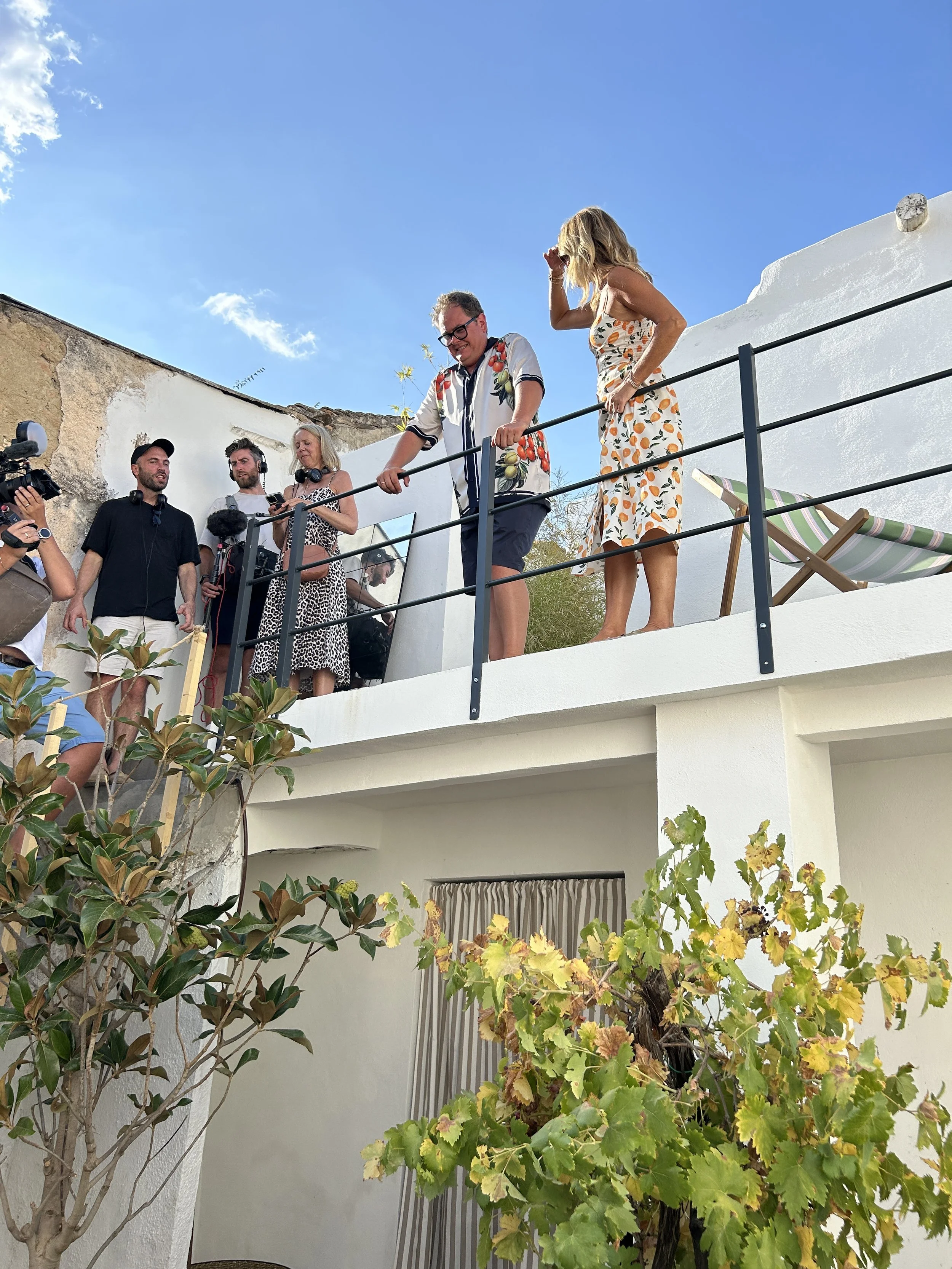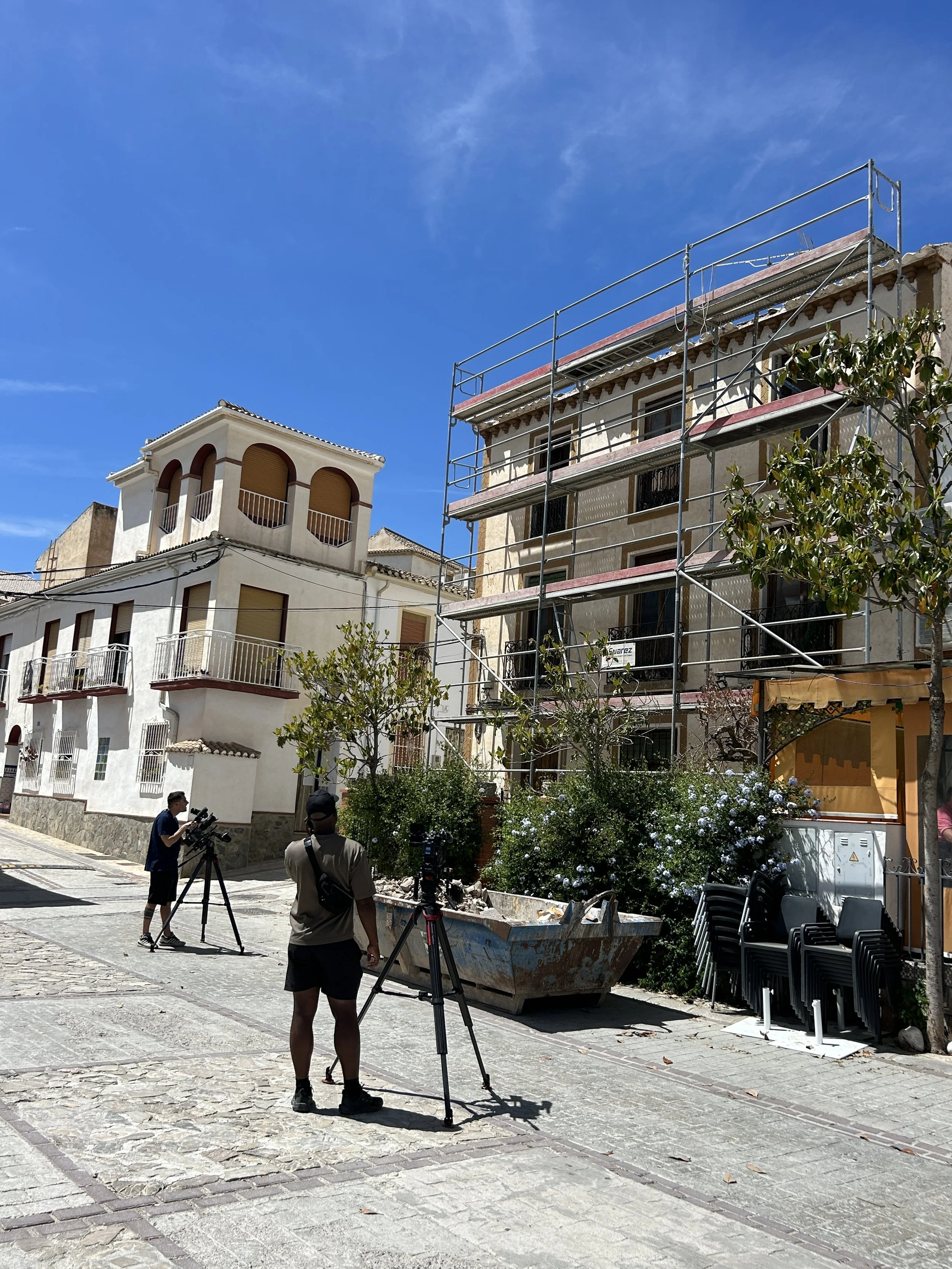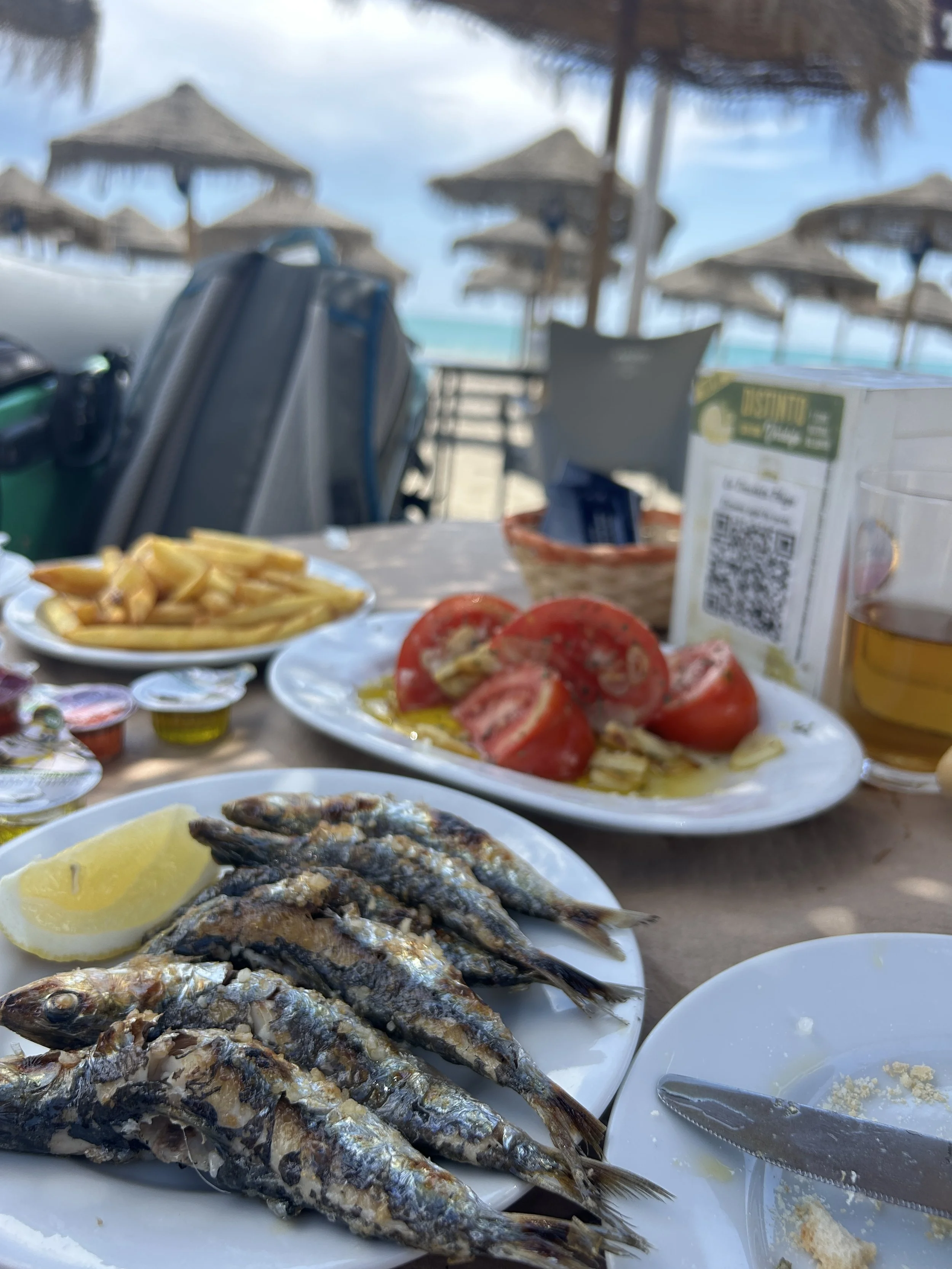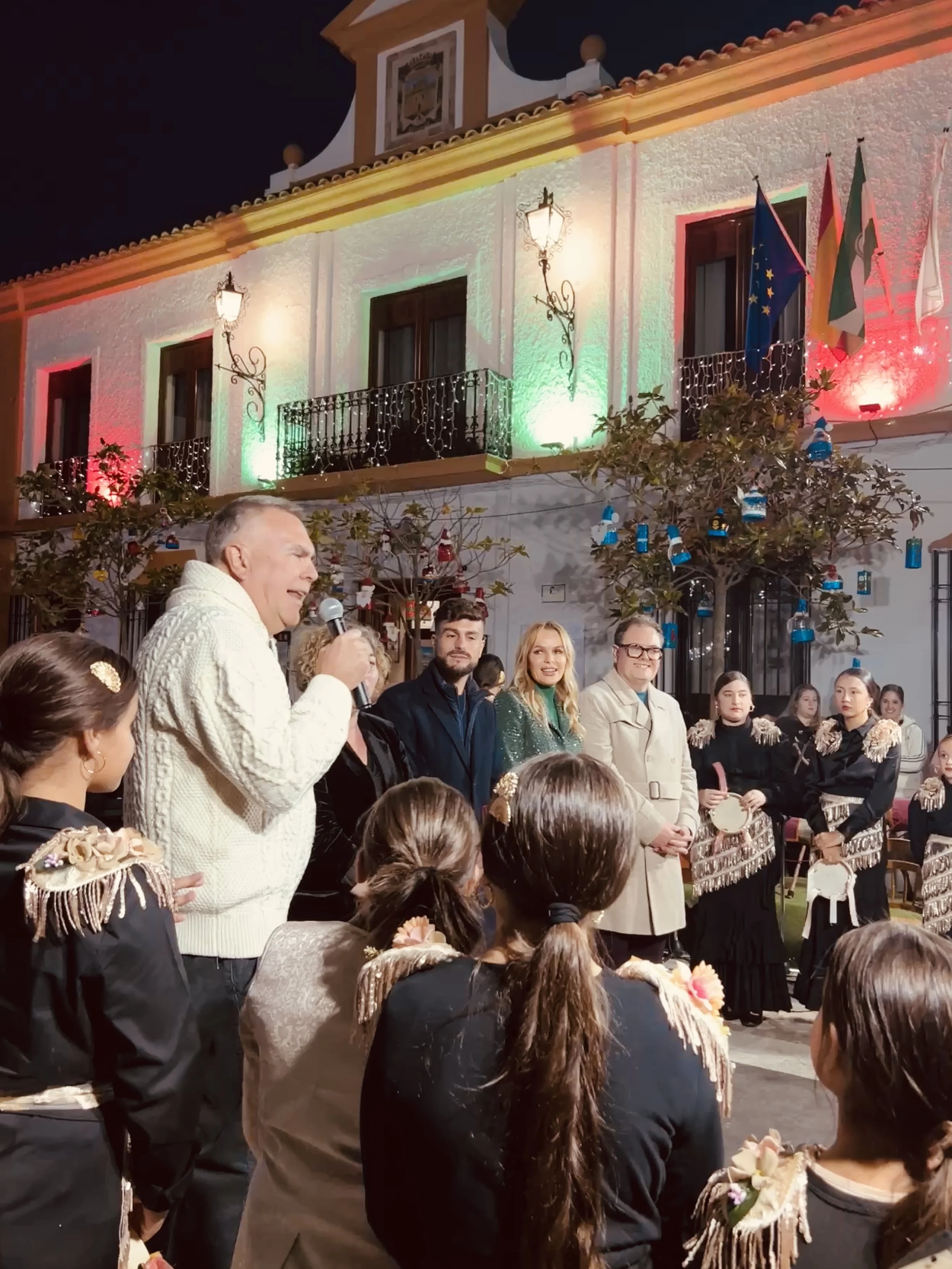Amanda and Alan’s Spanish Job - A Year On
One year ago, on 21st and 22nd August 2024, there were gatherings of friends and neighbours in Moclín to celebrate the end of filming of the BBC TV series, ‘Amanda and Alan’s Spanish Job’.
That hot week marked the culmination of almost 5 months of filming and, for us, a solid 8 months of work on an exciting project that had an impact both preceding and following the arrival in Moclín of Alan Carr and Amanda Holden.
As many of you will know if you have followed our series of posts about ‘Our Summer with Alan and Amanda’, our work on this project started in January 2023, when we were first approached by Voltage TV, the production company for the BBC. In brief, following that initial recce, Series 2 of the programme went on to be filmed in Tuscany and we thought nothing more of it and went about our normal business.
In November 2023, we were contacted by Voltage once again with the news that Series 3 would be filmed in Spain and the village of Moclín was on their list of possible locations.
So began a frantic couple of months trying to ensure that the producers had everything they needed in terms of information, and enough to tempt them to choose Moclín against some stiff competition from other locations in Spain.
The property in Moclín that was of interest to the producers was an elegant town house that is located in the main village square. This family house had been empty for 35 years and was symbolic of one of the central themes of the programme - depopulation in rural villages. It is staggering to think that only 100 years ago, the population of Moclín stood at over 1,000 people and there was probably half the number of residential properties at that time. Households were multi-generational, with homes filled with children, parents, grandparents and maybe uncles, aunts and cousins. As older generations died, fewer and fewer members of the younger generations wanted to take over the empty houses, as these younger people needed to leave the village to seek employment opportunities in the cities. As a result, a sad picture emerges of abandoned homes, once buzzing with family activity and now lying dormant with very few local people able or willing to take on the responsibility.
Before anything could be started or confirmed, we had to work closely with both the producers and the town hall to make sure that, if the property was purchased for the programme, it would be possible to get planning permission granted in time for the start of filming. To put this in perspective, the timeline was:
January 2024 : Second visit to look at houses for sale and meet with the town hall to assess feasibility.
February 2024: Preparing recommendations for places across Andalucia to film; liaising with our architect to come up with a workable restoration plan; answering a myriad of questions from the producers needing to understand the building process in Spain. Bearing in mind, the BBC had not yet commissioned Series 3 at this stage, but in order to ensure that there were no delays we had to set out the foundations.
We had to get the documentation for the house sorted and instruct the lawyers to draw up a contract so that the sale of the house could proceed as soon as the BBC green-lit the new series. This was not easy, as the house had 12 owners - the beneficiaries of the original owner’s will.
Throughout February and into March, there were an inordinate number of things to be organised and considered - accommodation for the production team during filming; bars being open when there were preproduction recces; NIE numbers to be applied for in order to buy the house; bank accounts to be set up; builders to meet; travelogue ideas to be discussed and introductions made.
We finally heard that the series had been commissioned by the BBC in early March! Given that filming was scheduled to start at the end of April, there was a HUGE amount to be done, not least completing the purchase of the house (which we, as Real Estate Agents Granada Village & Country , were selling). We had an initial completion date set for 21st March and when we got to the Notary it was discovered that a document was missing. The 12 members of the family selling the house had all assembled and we all had to disperse and wait for another date. We were aware that Easter was looming and any delay in the house purchase could knock everything else back.
Finally, we all got together again on 2nd April and ownership of the house was transferred; the Voltage production team was now the proud owner of a large 3 storey town house and work and filming was due to start at the end of April!
Of course, there are many other things to consider when buying and restoring an old house that has been empty for 35 years. There was no mains water and the meter had been removed; there was no electricity and, again, no meter. Everything had to be reconnected.
We were lucky that Mario, in the adjacent bar, allowed the use of his electricity (running an extension cable from the bar to the house) and water. Mario and his team were a godsend throughout filming.
Assembling the builders was the next hurdle.
We had already primed our own sub-contractors - electrician, plumber and carpenter - so they knew what was expected once we could start the work. Getting main contractors was a different matter, as builders are like gold-dust and good builders are usually booked solidly for at least 6 months in advance.
We held an open day and invited builders to come and have a look at the property and meet Scott, the project manager who works with Alan and Amanda both on screen and off.
Most of the builders were upfront and made it clear that there was no way they could find a team of 5-7 labourers to work every day and complete the project in just under 4 months. The roof needed to be completely renewed; the casita at the rear of the property was a ruin; the interiors all needed to be refurbished and restyled; the exterior windows needed to be replaced; the house had to be completely rewired and replumbed and all this needed to fit in with a filming schedule.
Our best hope was the Suárez Brothers, excellent local builders and with access to the scaffolding needed to renew the roof, but even Antonio Suárez was unsure whether or not he could get the required team together. He slept on it overnight and the following morning he confirmed that, with some judicious shuffling, he’d have the team ready to start on May 2nd.
The first day of filming with Alan and Amanda outside Bar La Plaza
As you can imagine, that year whizzed by in something of a blur and in a blink we arrived at the end of filming and the wrap parties.
So, what has this year been like in the wake of all this activity?
There was a short lull between the end of August and 24th January 2025, the date set for transmission of the series, so everything seemed slightly anticlimactic. In the background, we still had a lot of work to do to maximise our own publicity surrounding the programme, but couldn’t physically do anything until the programme aired.
Needless to say, as soon as the programme was aired we were run off our feet. Our property, Esperanza 9 which featured in episode 7 of the show, was booked solidly until November of this year within one week of the programme airing. We then had a wave of bookings for Casa Higueras until we reached stage where we had to block out dates just so we had time to breathe.
We complied a list of all the accommodation providers in the municipality and published this on our blog, so that we could redirect prospective visitors to other places to stay. A stream of sightseers started to arrive in the village on a daily basis, to have photographs taken outside the ‘BBC House’. It is amazing that a TV programme can have such an impact.
Has the impact been positive? I may go into more detail in a future post, but we thought it would be a good idea to ask one or two people who were not so heavily involved in the project but whose opinion matters to us.
Mario, mentioned above, runs the bar immediately next door to the BBC House, and he helped us enormously throughout the entire year. I asked him, today, if he had noticed an increase in visitors and whether or not the project had had a positive effect on the village.
“Hi Ian! Yes, of course. The number of visitors from the UK who came to see the house skyrocketed, and as a result they are staying in the village and buying food and drink here. I think it’s been a great step forward for Moclín’s social life.”
The manager of the property on the other side of Mario’s bar had this to add:
“From a personal point of view, I think it [the BBC project] has been very beneficial for everyone and the entire village. You’ve brought in a beautiful project, and I thank you for putting so much effort into all the projects you do for the area. Thank you very much, and we’ll keep fighting for Moclín together.”
When the programme first aired on 24th January 2025, the entire series appeared on iPlayer. Website traffic to Granada Village and Country shot up to 48,000 unique visitors over the course of that first month. This year, unique visits to the Casa Alamanda page on the website page have exceeded 51,000.
The house, and Moclín, has been featured in almost every UK national newspaper, and in several glossy magazines. AD España ran a feature about the house and our part in the programme, and Ideal, a local newspaper, ran articles and video content about the show and the restored house.
There definitely feels to be optimism in the village around tourism and the opportunities that tourism presents, and we hope that we can, collectively, build on this over the next few years. It will be interesting to see what the village will look like in 5 years time…










